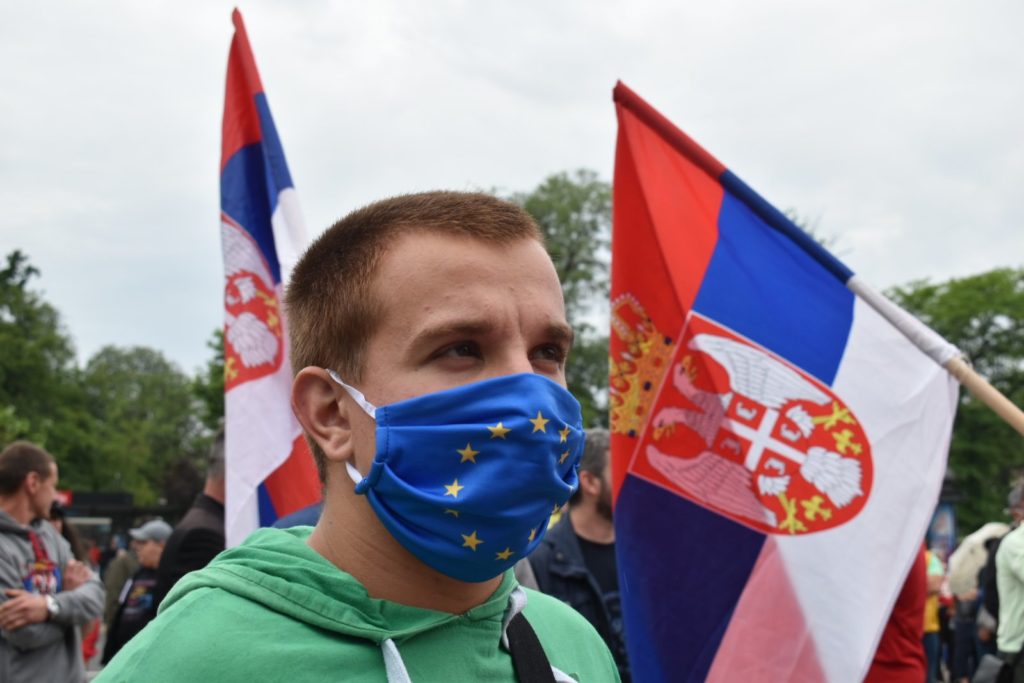In the elections on Sunday, the governing coalition headed by president Vucic received close to 62 % of the votes and increased its number of seats to about 76 % of the total in the Serbian parliament because a long list of smaller parties did not pass the threshold. Voter turnout was just over 50 % after the major opposition parties boycotted the elections.
The elections had been scheduled to take place on 26 April but were postponed because of the coronavirus crisis.
Serbia has until now been considered as a frontrunner among the candidate countries in the Western Balkans and is engaged in a sensitive dialogue with Kosovo on their bilateral relations. The European Commission has made it clear that urgent reforms are necessary for Serbia’s EU accession.
EU also expects progress in the EU-facilitated Dialogue between Belgrade and Pristina. Currently, the US has taken over the facilitation of the dialogue and has invited the presidents of the two countries to the White House on this coming Saturday.
Election boycotts and disruptions in the work of parliaments is normally an issue of concern to the European Commission and any backsliding affects the accession process of the candidate countries.
Despite the non-inclusiveness of the elections, the Commission was reluctant to react immediately to the election results and preferred to wait for the preliminary findings and conclusions of the international observers from the OSCE Office for Democratic Institutions and Human Rights (ODIHR).
A Commission spokesperson explained that EU’s principled position is that boycotts are not the solution. “In all cases, we always encourage all political forces to participate in the electoral process. This is the best way to be able to represent and defend the interests of their constituencies.”
Observers report
That report was published already on Monday (22 June) and contained criticism on several points in the elections process but stopped short of assessing whether the elections were “free and fair”. The Brussels asked OSCE if the issue will be addressed in the final report.
“Elections are too complex for us to reduce their outcome to two words,” Katya Andrusz, spokesperson of the OSCE Office for Democratic Institutions and Human Rights, replied.
“We don’t use that phrase to describe an election result because we’re looking at a process with numerous components, including for example the legal framework and its implementation, campaign activities, media coverage of the campaign, and the work of the election administration.”
She explained that ODIHR was forced to suspend its election observations following the outbreak of the COVID-19 pandemic. “The continuing restrictions on cross-border travel as well as safety concerns created challenges for its election activities and particularly for the deployment of long- and short-term observers, who are seconded directly by OSCE countries.”
“We were therefore pleased that we succeeded in sending a special election assessment mission (SEAM) made up of a team of highly qualified experts to observe the Serbian parliamentary elections,” she added.
“While contestants in Serbia’s parliamentary elections were able to campaign and fundamental freedoms were respected, voter choice was limited by the governing party’s overwhelming advantage and the promotion of government policies by most major media outlets,” the observers summarized their report.
“Most of the opposition parties boycotted the elections because they didn’t want to give legitimacy to a process that is not democratic,” commented Biljana Stojković, a civil activist and biology professor at the University of Belgrade. “With the governing coalition winning a ‘supermajority’ of seats and no real opposition in the parliament, the mask of democracy over the autocratic substance is off.”
Election process
Opposition MPs have boycotted parliament sessions since early 2019, citing instances of breaches of parliamentary procedure and absence of a meaningful legislative debate and oversight of the executive, according to the observers.
On election day, voting appeared to go smoothly with procedures generally followed, but ODIHR observers noted cases and received reports of violations of the campaign silence that benefitted the ruling party, according to the report.
Numerous recommendations previously made by ODIHR remain unaddressed, including areas such as election administration, media, campaign finance, dispute resolution and sanctions for electoral violations. “Overall, the campaign finance regulatory framework does not ensure transparency of campaign finance and the effectiveness of oversight.”
The election was characterized by intense political polarization, amidst a boycott by a considerable section of the opposition. In addition, the dual role of the president as leader of the ruling party has increasingly blurred the line between his official duties and the election campaign.
Most major TV channels and newspapers promoted government policy, and the few media outlets offering alternative views have limited outreach and were therefore unable to provide an effective counterbalance. Despite a longstanding ODIHR recommendation, voter lists were not displayed for public scrutiny.
Following the OSCE report, High Representative/ Vice-President Josep Borrell and Neighbourhood and Enlargement Commissioner Oliver Varhelyi issued a cautious statement on “one of the first elections held in Europe since the outbreak of the coronavirus pandemic”.
“The European Union looks forward to the OSCE/ODIHR final report and recommendations for future elections to be issued in the coming months. We expect all political actors and relevant institutions to engage in a transparent, decisive and inclusive dialogue on the implementation of these recommendations to address long-standing electoral shortcomings well ahead of the next elections.”
In the statement, the EU also ”looks forward to engaging with the next government to take forward swiftly the urgent reforms necessary for Serbia’s EU accession”. As “Serbia’s top donor and investor, and its most important trade and economic partner, the EU is fully committed to continue supporting Serbia’s EU accession process as well as economic recovery following the coronavirus crisis.”
M. Apelblat
The Brussels Times

